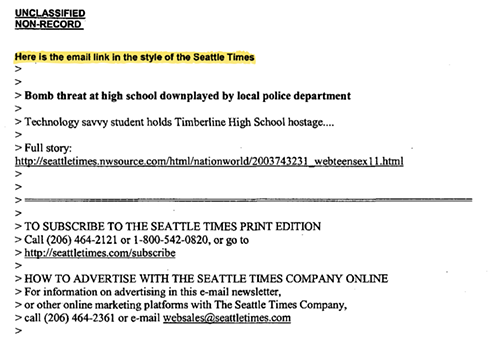Updated — Oct. 29, 10:00 a.m. ET
The FBI created a fake news story on a phony Seattle Times website to plant tracking software on the computer of a bomb threat suspect at Timberline High School in Lacey, Washington, according to a report from the Electronic Frontier Foundation.
In 2007, Timberline High School received multiple bomb threats and was forced to evacuate at least twice, the Seattle Times reported.
The tactic "led to the arrest and conviction of a 15-year-old student," the Seattle Times reported.
The documents were first published in April 2011 and revealed Monday on Twitter by Christopher Soghoian, Principal Technologist for the ACLU in Washington, D.C.
In 2007, FBI sent malware via a link intended to look like a Seattle Times/AP story. https://t.co/Se9f0NXGd1 at pages 61-62.
That the FBI impersonated a newspaper's website to deliver malware to a target is outrageous. Over the top crazy.
The FBI impersonating the press is just as irresponsible as the CIA running fake immunization programs. Completely unacceptable.
I give it two weeks, tops, before a Member of Congress writes a letter to the FBI demanding answers re: the Seattle Times impersonation.
The Seattle Times reports that the EFF documents show that the FBI posted a fake Associated Press story "in the style of the Seattle Times," and sent the link to the suspect's Myspace page.

Seattle Times editor Kathy Best issued a furious response, saying, "not only does that cross the line, it erases it."
"We, like you, just learned of this and are seeking answers ourselves from the FBI and the U.S. Attorney's office. But we are outraged that the FBI misappropriated the name of The Seattle Times to secretly install spyware on the computer of a crime suspect. Not only does that cross the line, it erases it. Our reputation—and our ability to do our job as a government watchdog—is based on trust. And nothing is more fundamental to that trust than our independence from law enforcement, from government, from corporations and from all other special interests. The FBI's actions, taken without our knowledge, traded on our reputation and put it at peril."
Frank Montoya, Jr., the Special Agent in Charge of the FBI's Seattle office, defended the agency's tactics.
"We identified a specific subject of an investigation and used a technique that we deemed would be effective in preventing a possible act of violence in a school setting. Use of that type of technique happens in very rare circumstances and only when there is sufficient reason to believe it could be successful in resolving a threat. We were fortunate that information provided by the public gave us the opportunity to step in to a potentially dangerous situation before it was too late."
Earlier this month, BuzzFeed News reported that a federal agent set up a fake Facebook page impersonating a young woman:
The Justice Department is claiming, in a little-noticed court filing, that a federal agent had the right to impersonate a young woman online by creating a Facebook page in her name without her knowledge. Government lawyers also are defending the agent's right to scour the woman's seized cell phone and to post photographs — including racy pictures of her and even one of her young son and niece — to the phony social media account, which the agent was using to communicate with suspected criminals.
The Electronic Frontier Foundation's findings were first published by EFF in April 2011. Christopher Soghoian told BuzzFeed News, "It looks like no one noticed the Seattle Times issue until I stumbled on it [Monday]." A previous version of this post stated that the findings were published in a new report.
